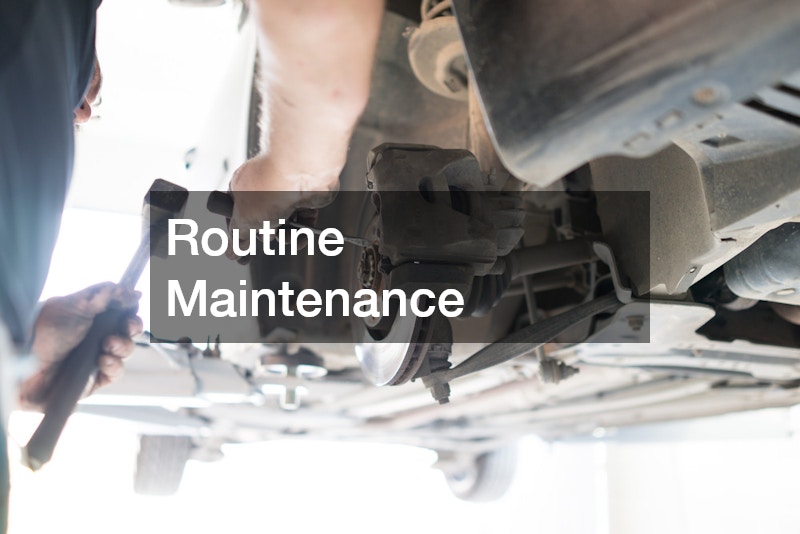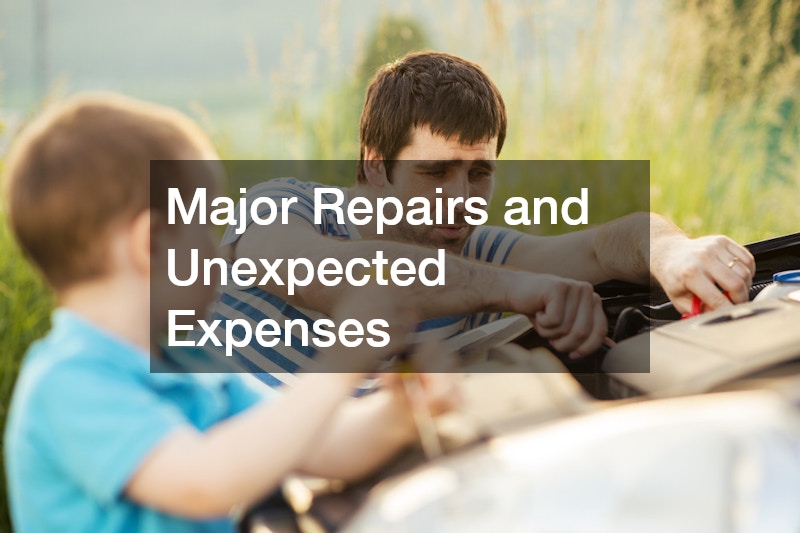Owning a truck can be a rewarding experience, providing utility, versatility, and power for both personal and professional use. However, truck ownership comes with a set of responsibilities that go beyond the initial purchase price. Understanding the various expenses associated with maintaining and operating a truck is essential for anyone considering ownership. From routine maintenance to unexpected repairs, the costs of keeping a truck in top shape can add up quickly.
In this guide, we’ll explore the key expenses associated with owning and maintaining a truck. We’ll cover everything from routine maintenance tasks, such as brake repairs and oil changes, to more significant expenses like upgrades, collision repairs, and fuel costs.
Initial Purchase Costs

The first expense any truck owner faces is the initial purchase price. Depending on the make, model, and whether you buy new or used, trucks can range widely in price. While new trucks come with the latest technology and warranties, used trucks can offer savings upfront but may come with higher maintenance costs due to wear and tear.
For those looking to customize their vehicle, upgrades such as aftermarket wheels and rims are another consideration. While these upgrades can enhance the truck’s appearance and performance, they also add to the overall expense of ownership. Aftermarket wheels, in particular, may require special tires or maintenance that adds to the cost.
Fuel Costs
One of the most significant ongoing expenses of truck ownership is fuel. Trucks, especially larger models, tend to have lower fuel efficiency compared to smaller vehicles, which can result in higher fuel costs. It’s important to factor in how much driving you plan to do and how fuel-efficient the truck is before making a purchase.
While fuel-efficient models are available, many trucks are used for heavy-duty purposes, which can require more power and therefore more fuel. Additionally, modifications like truck equipment such as lift kits or heavy-duty towing attachments can decrease fuel efficiency further.
Routine Maintenance

Maintaining your truck regularly is critical to keeping it in good working condition. Routine maintenance tasks may seem like small expenses at first, but they add up over time. These maintenance tasks help prevent major repairs and keep your truck running smoothly for years to come.
1. Oil Changes
Regular oil changes are essential for maintaining engine health. Oil lubricates the engine’s moving parts, preventing excessive wear and tear. Most experts recommend changing the oil every 5,000 to 7,500 miles, depending on the type of oil and how you use your truck. Skipping oil changes or delaying them can result in engine damage, leading to more expensive repairs down the road.
2. Brake Repairs
Maintaining the brakes on your truck is another crucial part of vehicle upkeep. Over time, brake pads wear down and need to be replaced. Brake repairs and auto brake replacements are routine services that every truck owner should expect to handle, especially if you frequently tow heavy loads or drive in stop-and-go traffic.
Failing to replace worn brake pads can lead to more serious issues, such as damage to the rotors or brake calipers, which significantly increases the cost of repairs. Regular brake inspections and maintenance can help prevent these problems and ensure that your truck’s braking system remains in optimal condition.
3. Tire Maintenance
Tires play a critical role in your truck’s performance and safety. Regular tire maintenance, including rotating the tires, checking tire pressure, and replacing worn tires, is essential. Additionally, for those who have invested in aftermarket wheels and rims, maintaining those wheels with proper cleaning and care is necessary to keep them in top shape.
New tires for trucks can be expensive, especially for larger models or specialty tires designed for off-road use. However, keeping your tires in good condition will help improve fuel efficiency, provide better handling, and reduce the risk of blowouts.
4. Air Conditioning Repair
As with any vehicle, the air conditioning system in your truck may require occasional repairs. Over time, components like the compressor or refrigerant lines can wear out or leak, leading to diminished performance or complete failure of the system. Air conditioning repair can be necessary, especially if you live in a hot climate or use your truck for long trips.
While air conditioning repairs are often less expensive than major mechanical repairs, they still add to the overall cost of truck ownership. Regular maintenance of the AC system, including checking refrigerant levels and inspecting components, can help prevent expensive repairs.
Major Repairs and Unexpected Expenses

No matter how well you maintain your truck, there’s always the possibility of unexpected repairs or major component failures. While some issues can be addressed through local car repairs, more serious problems may require specialized services.
1. Collision Repairs
Accidents can happen at any time, whether it’s a minor fender-bender or a more serious collision. After an accident, auto collision repairs can be a significant expense. Visiting a collision repair shop is necessary to assess and fix the damage to your truck. The cost of repairs will depend on the extent of the damage and whether parts need to be replaced or repaired.
For minor damage, an auto window tinting company or auto paint shop may be able to handle cosmetic fixes, such as restoring the appearance of the windows or repainting scratches. However, for more serious damage, especially to the frame or engine, the costs can rise quickly.
2. Engine Repairs
Trucks are often subjected to heavier loads and more strenuous driving conditions than smaller vehicles, which means the engine can experience more wear and tear over time. Major engine repairs, such as replacing the transmission or fixing the cylinder heads, can be costly. Regular maintenance, including oil changes and engine inspections, can help reduce the likelihood of major engine issues, but they can’t always be avoided.
For those who use their trucks for commercial purposes or long-distance driving, finding trusted truck repair shops is essential for addressing engine problems. Experienced truck mechanics can diagnose and fix issues specific to heavy-duty trucks, ensuring your vehicle stays in working order.
Customization and Upgrades
Many truck owners enjoy customizing their vehicles with additional features, upgrades, or specialized equipment. While these customizations can enhance the performance and appearance of your truck, they also come with added costs.
1. Aftermarket Wheels and Rims
Upgrading to aftermarket wheels and rims is a popular customization option for truck owners. These upgrades can improve the aesthetic of the vehicle and even enhance performance, depending on the type of wheels chosen. However, aftermarket wheels often come at a higher price than standard options and may require specific types of tires or additional maintenance.
It’s essential to factor in the cost of maintaining aftermarket wheels and rims, as they can wear differently than standard wheels, especially if they are used for off-roading or heavy-duty purposes.
2. Truck Equipment
For those who use their trucks for work or specialized purposes, investing in truck equipment is a necessary expense. This may include items like toolboxes, bed liners, towing packages, or suspension upgrades. While these additions can increase the functionality of your truck, they also increase the overall cost of ownership.
For those in industries like construction or landscaping, investing in high-quality truck equipment is often essential for the job. However, it’s important to research the best options for your needs and budget, as some equipment can be more expensive than others.
Insurance and Registration
Another ongoing cost of truck ownership is insurance and registration fees. Trucks, particularly larger models, may have higher insurance premiums due to their size and weight. The cost of insurance can also increase if you add customizations or use your truck for commercial purposes.
It’s essential to shop around for insurance policies that provide the right level of coverage for your truck. Some owners may need additional coverage for customizations like aftermarket wheels and rims or truck equipment. It’s also important to keep your truck’s registration up to date, as failure to do so can result in fines or penalties.
Total Cost of Ownership
When considering the total cost of owning and maintaining a truck, it’s important to factor in all the expenses mentioned above. From routine maintenance like brake repairs and air conditioning repair to unexpected repairs and customizations, the costs of truck ownership can quickly add up.
1. Routine Maintenance Costs
The cost of regular maintenance will vary depending on how frequently you drive and how hard you use your truck. For example, trucks used for towing or hauling may require more frequent auto brake replacements and oil changes. Budgeting for these routine services is essential to avoid surprises.
2. Major Repair Costs
Major repairs, such as collision repairs or engine replacements, can be expensive. Having a trusted collision repair shop or truck repair shop on hand can help reduce the stress of dealing with these unexpected costs. Additionally, setting aside an emergency fund for vehicle repairs can provide peace of mind.
3. Customization and Upgrade Costs
If you choose to upgrade your truck with features like aftermarket wheels and rims or additional truck equipment, be prepared to pay for the initial purchase as well as any ongoing maintenance these upgrades require. While these customizations can enhance the performance or appearance of your truck, they also come with added expenses.
Common Truck Issues and How to Detect Them

Trucks, especially those used for heavy-duty purposes, are prone to wear and tear over time. Identifying common truck issues early on can save you from costly repairs and potential breakdowns. Knowing what to look for and staying proactive about maintenance helps ensure your truck remains reliable and efficient. Here are some of the most common truck issues and tips on how to detect them.
1. Brake Problems
Brake issues are among the most critical problems to address, as they directly affect your safety. Over time, brake components such as pads, rotors, and calipers can wear down, making it harder for your truck to stop effectively.
Signs of brake problems:
- Squealing or grinding noises when braking, which could indicate worn-out brake pads.
- A soft or spongy brake pedal, which may be caused by air in the brake lines or a fluid leak.
- Vibrations or pulsations in the brake pedal, which may signal warped rotors.
- A burning smell after heavy braking, which could indicate overheated brakes.
If you notice any of these signs, it’s essential to schedule brake repairs or auto brake replacements as soon as possible. Ignoring brake issues can lead to dangerous driving conditions and more costly repairs.
2. Engine Problems
Your truck’s engine is its powerhouse, and keeping it in good working order is critical for performance and reliability. While modern trucks are designed to be durable, engine issues can still arise due to regular wear or poor maintenance.
Signs of engine problems:
- The check engine light illuminates on the dashboard, which can indicate anything from a loose gas cap to more serious issues like engine misfires or sensor failures.
- Strange noises such as knocking or rattling, which can point to internal engine problems like worn bearings or piston issues.
- Loss of power or acceleration, which may be due to clogged fuel injectors, a malfunctioning turbocharger, or a failing fuel pump.
- Excessive exhaust smoke, which can be a sign of issues with the fuel system, oil leaks, or a faulty catalytic converter.
Regular maintenance, such as oil changes and timely repairs by a trusted truck repair shop, can help prevent engine issues from worsening.
3. Transmission Problems
Transmission problems can lead to poor performance and, in severe cases, leave your truck unable to shift gears properly. Transmission issues are particularly common in trucks that tow heavy loads or drive in rough conditions.
Signs of transmission problems:
- Delayed shifting, where the truck hesitates before changing gears.
- Grinding or shaking while shifting gears, which may indicate a worn clutch or other internal transmission components.
- Slipping gears, where the truck suddenly shifts out of gear or changes gears unexpectedly.
- Transmission fluid leaks, often identified by red or brown fluid pooling under the truck.
Addressing transmission problems early can save you from needing a full transmission replacement, which can be one of the most expensive truck repairs.
4. Suspension Problems
Your truck’s suspension system is designed to provide a smooth ride, even when carrying heavy loads. However, over time, the suspension components, such as shocks, struts, and springs, can wear out or fail.
Signs of suspension problems:
- A rough or bumpy ride, especially when driving over uneven terrain.
- Excessive bouncing after hitting a bump, which may indicate worn-out shocks or struts.
- Uneven tire wear, which can be caused by misaligned suspension components.
- The truck sagging to one side, which could indicate a broken spring or other suspension component.
Regularly inspecting and maintaining your suspension system can prevent more significant issues down the line. If you notice any of these symptoms, it’s a good idea to have your truck inspected by a local car repair professional who can diagnose and fix the issue.
5. Tire Issues
Tire problems are common in trucks, especially if the tires aren’t properly maintained. Issues such as underinflated or overinflated tires, uneven wear, and poor alignment can all lead to reduced performance and safety risks.
Signs of tire problems:
- Uneven tread wear, which may indicate improper tire alignment or suspension problems.
- Low tire pressure, which can lead to poor fuel efficiency and increased wear on the tires.
- Vibrations in the steering wheel or throughout the truck, which can indicate unbalanced tires or alignment issues.
- Cracks, bulges, or bald spots on the tires, signaling that the tires need replacement.
Regular tire rotations, alignment checks, and visiting a tire repair shop when needed can help extend the life of your tires and improve the overall safety and performance of your truck.
Owning a truck is a significant investment, and the costs of maintaining and repairing a truck can add up over time. From regular maintenance tasks like brake repairs and air conditioning repair to more significant expenses like auto collision repairs and customizations, it’s essential to budget for both the expected and unexpected costs of truck ownership.
By staying on top of routine maintenance and working with trusted repair shops, you can keep your truck running smoothly and avoid costly repairs down the road. Whether you’re using your truck for work, recreation, or daily driving, understanding the full cost of ownership is key to ensuring that your truck remains reliable and in good condition for years to come.
